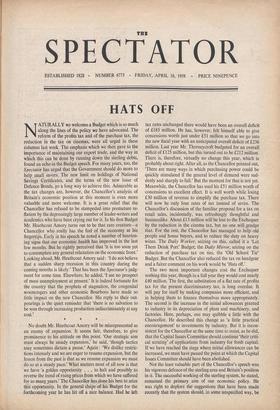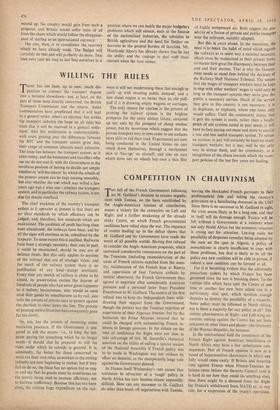HATS OFF
NATU,RALLY we welcome a Budget which is so much along the lines of the policy we have advocated. The reform of the profits tax and of the purchase tax, the reduction in the tax on cinemas, were all urged in these columns last week. The emphasis which we then gave to the importance of maintaining our export trade, and the way in which this can be done by running down the sterling debts, found an echo in the Budget speech. For many years, too, the Spectator has urged that the Government should do more to help small savers.. The new limit on holding's of National Savings Certificates, and the terms of the new issue of Defence Bonds, go a long way to achieve this. Admirable as the tax changes are, however, the Chancellor's analysis of Britain's economic position at this moment is even more valuable and more welcome. It is a great relief that the Chancellor has refused to be stampeded-into premature re- flation by the depressingly large number of leader-writers and academics who have been crying out for it. In his first Budget Mr. Heathcoat Amory turns out to be that rare creature—a Chancellor who .really has the feel of the economy at his fingertips., Early in his speech he noted a number of hearten- ing signs that our economic health has improved in the last few months. But he rightly perceived that 'it is too soon yet to contemplate any general relaxation on the economic front.' Looking ahead, Mr. Heathcoat Amory said : 'I do not believe that a sudden sharp recession in this country during the coming months is likely.' That has been the Spectator's judg- ment for some time. Elsewhere, he added, 'I see no prospect of mass unemployment at present' It is indeed fortunate for the country that the prophets of stagnation, the congenital woemongers and other economic Bourbons have made so little impact on the new Chancellor. His reply to their out- pourings is the quiet reminder that 'there is no salvation to be won through increasing production indiscriminately at any cost.'
* * * No doubt Mr. Heathcoat Amory will be misrepresented as an enemy of expansion. It seems fair, therefore, to give prominence to his attitude on this point. 'Our strategic aim must always be steady expansion,' he said, 'though tactics may sometimes dictate a pause.' Again : 'We dislike restric- tions intensely and we are eager to resume expansion, but the lesson from the past is that as we resume expansion we must do so at a steady pace,' What matters most of all now is that we have 'a golden opportunity . . . to halt and possibly to reverse the trend of rising prices from which we have suffered for so many, years.' The Chancellor has.done his best to seize this opportunity. In the general shape:of his Budget for the forthcoming year he has hit off a nice balance. Had he left tax rates unchanged there would have been an overall deficit of £185 million. He has, however, felt himself able to give concessions worth just under £51 million so that we go into the new fiscal year with an anticipated overall deficit of £236 million. Last year Mr. Thorneycroft budgeted for an overall deficit of £125 million, but this turned out to be £212 million. There is, therefore, virtually no change this year, which is probably about right. After all, as the Chancellor pointed out, `There are many ways in which purchasing power could be quickly stimulated if the general level of demand were sud- denly and sharply to fall.' But the moment for that is not yet. Meanwhile, the Chancellor has used his £51 million worth of concessions to excellent effect. It is well worth while losing £30 million of revenue to simplify the purchase tax. There will now be only four rates of tax instead of seven. The Chancellor's discussion of the familiar proposal for a tax on retail sales, incidentally, was refreshingly thoughtful and businesslike. About £13 million will be lost to the Exchequer by the reduction in the cinema tax, but no one will grudge that. For the rest, the Chancellor has managed to help old people and house buyers, and to reduce the duty on heavy wines. The Daily Worker, seizing on this, called it a 'Let Them Drink Port' Budget; the Daily Mirror, seizing on the reduction of purchase tax on ties, the 'Old School Tie' Budget. But the Chancellor also reduced the tax on headgear and a fairer comment on his work would be 'Hats off.'
The two most important changes cost the Exchequer nothing this year, though in a full year they would cost nearly £40 million. The first, the substitution of a flat rate of profits tax for the present discriminatory tax, is long overdue. It will pay for itself by making companies more efficient, and in helping them to finance themselves more appropriately. The second is the increase in the initial allowances granted to industry in its depreciation of plant and machinery, and factories. Here, perhaps, one may quibble a little with the Chancellor. He described this change as 'a little practical encouragement' to investments by industry. But it is incon- sistent for the Chancellor at the same time to insist, as he did, that the Capital Issues Committee should continue 'their criti- cal scrutiny' of applications from industry for fresh capital. If we have reached the stage where initial allowances can be increased, we must have passed the point at which the Capital Issues Committee should have been abolished.
Not the least valuable part of the Chancellor's speech was his vigorous defence of the sterling area and Britain's position in it.. The successful working of the sterling system, he stated, remained the primary aim of our economic policy. He was right to deplore the suggestions that have been made recently that the system should, in some unspecified way, be
wound up. No country would gain from such a proposal, and Britain would suffer most of all from the chaos which would follow the disappear- ance of sterling as an international currency.
'The aim, then, is to consolidate the recovery which we have already made. The Budget will certainly do that and will probably do more. This time next year we may at last find ourselves in a position where we can tackle the major budgetary problems which still remain, such as the finance of the nationalised industries, the subsidies to British agriculture and the need for further re- ductions in the general burden of taxation. Mr. Heathcoat Amory has already shown that he has the ability and the courage to deal with these matters when the time comes.





























 Previous page
Previous page